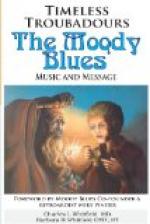Difficulty was thus intentional; in the case of several troubadours it affected the whole of their writing, no matter what the subject matter. They desired not to be understood of the people. Dean Gaisford’s reputed address to his divinity lecture illustrates the attitude of those troubadours who affected the trobar clus: “Gentlemen, a knowledge of Greek will enable you to read the oracles of God in the original and to look down from the heights of scholarship upon the vulgar herd.” The inevitable reaction occurred, and a movement in the opposite direction was begun; of this movement the most distinguished supporter was the troubadour, Guiraut de Bornelh. He had been one of the most successful [38] exponents of the trobar clus, and afterwards supported the cause of the trobar clar. Current arguments for either cause are set forth in the tenso between Guiraut de Bornelh and Linhaure (pseudonym for the troubadour Raimbaut d’Aurenga).
(1) I should like to know, G. de Bornelh, why, and for what reason, you keep blaming the obscure style. Tell me if you prize so highly that which is common to all? For then would all be equal.
(2) Sir Linhaure, I do not take it to heart if each man composes as he pleases; but judge that song is more loved and prized which is made easy and simple, and do not be vexed at my opinion.
(3) Guiraut, I do not like my songs to be so confused, that the base and good, the small and great be appraised alike; my poetry will never be praised by fools, for they have no understanding nor care for what is more precious and valuable.
(4) Linhaure, if I work late and turn my rest into weariness for that reason (to make my songs simple), does it seem that I am afraid of work? Why compose if you do not want all to understand? Song brings no other advantage.
(5) Guiraut, provided that I produce what is best at all times, I care not if it be not so widespread; commonplaces are no good for the appreciative—that is why gold is more valued than salt, and with song [39] it is even the same.
It is obvious that the disputants are at cross purposes; the object of writing poetry, according to the one, is to please a small circle of highly trained admirers by the display of technical skill. Guiraut de Bornelh, on the other hand, believes that the poet should have a message for the people, and that even the fools should be able to understand its purport. He adds the further statement that composition in the easy style demands no less skill and power than is required for the production of obscurity. This latter is a point upon which he repeatedly insists: “The troubadour who makes his meaning clear is just as clever as he who cunningly conjoins words.” “My opinion is that it is not in obscure but in clear composition that toil is involved.” Later troubadours of renown supported his arguments; Raimon de Miraval (1168-1180) declares: “Never




